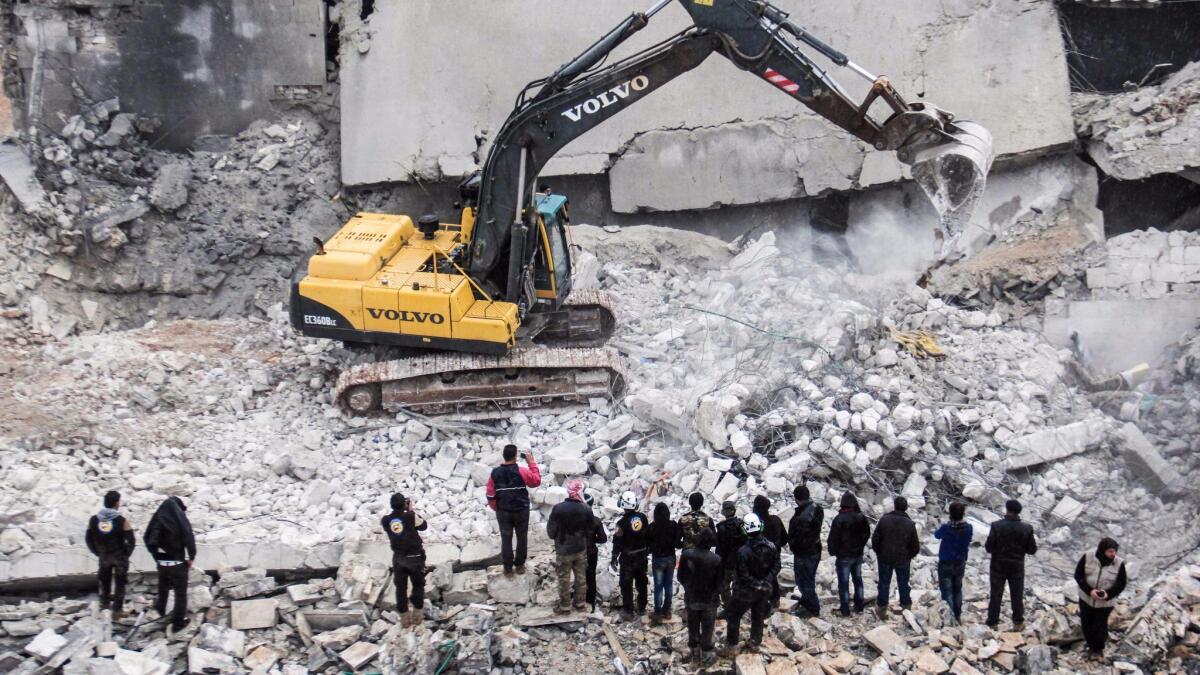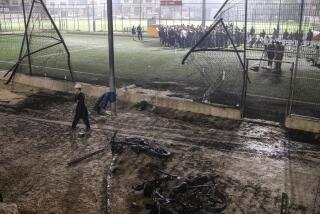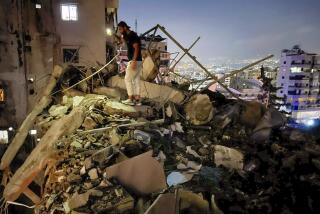Pentagon says deadly airstrike in Syria was legal and on-target, but may have killed one civilian

Reporting from Washington — A U.S. military investigation has concluded that an airstrike targeting a meeting of Al Qaeda operatives in Syria was legal, on target and did not inadvertently kill scores of civilians as humanitarian groups have alleged.
The Pentagon’s classified investigation of the March 16 bombing on a building in Al Jinah village near Aleppo found that at worst one civilian was killed or injured — possibly a child, based on the height observed from aerial surveillance, according to Army Brig. Gen. Paul Bontrager, the lead investigating officer from U.S. Central Command in Tampa, Fla.
“We are confident this was a meeting of Al Qaeda leaders and members,” he told reporters at the Pentagon via teleconference. “This was not a meeting of civilians.”
Analysts with a U.S. special operations task force, which hunts terrorist groups around the globe, watched the site for three days, Bontrager said. The target underwent what the military calls a thorough assessment, review and validation process, he said, before the order was made to scramble U.S. F-15 fighter jets and MQ-9 Reaper drones to destroy it.
The investigation report, which was not publicly released, did identify several shortfalls, however, including failing to recognize that the targeted building was a school or madrassa associated with a nearby mosque.
Religious buildings, such as churches and mosques, are protected against U.S. military airstrikes. If commanders believe they have been overtaken by enemy forces, the buildings can be targeted only with the approval of senior military officers.
No U.S. service member was punished as a result of the oversight for not properly classifying it, Bontrager said.
“There was no negligence found,” he said, adding that the airstrike itself was lawful.
U.S. military investigators did not visit the site, nor did they interview surviving victims, first-responders, or on-the-ground witnesses, Bontrager said. The area is known to be under Al Qaeda control.
The Pentagon had released a black-and-white aerial photo of a compound that it said showed the small mosque nearby still standing. A much larger building across the road was reduced to rubble.
That building was the newly built Omar Ibn al-Khatab mosque, according to the monitoring group Human Rights Watch. The group released a lengthy report April 18 that featured interview transcripts, 3-D modeling of the building, and video footage of the building before and after the attack.
The report, based on interviews from 14 people who had either witnessed the attack firsthand or had visited in the aftermath, determined that the mosque was bombed during night prayers, then a second wave of warplanes strafed survivors as they attempted to flee.
At least 38 people were killed in the attack, Human Rights Watch said.
The Syrian Observatory for Human Rights, a British-based monitoring group with a network of activists in Syria, reported that the airstrike killed at least 49 people.
The incident is the latest example of the gulf in reporting that exists between the Pentagon and Syrian human rights and humanitarian aid groups on the impact of deadly airstrikes.
Obtaining accurate independent figures is difficult because of the challenges of reporting on the ground in the multi-sided Syrian civil war.
The Pentagon estimates that at least 484 civilians have been killed in more than 22,123 airstrikes launched by the U.S. and its allies in Iraq and Syria since the air war against Islamic State began in mid-2014.
Independent monitoring groups say, however, that errant bombs or poor targeting have caused thousands of civilian casualties.
Twitter: @wjhenn
ALSO:
Climate change is real: Just ask the Pentagon
Trump administration stops disclosing troop deployments in Iraq and Syria
U.S. launches dozens of missiles at Syria in response to chemical weapons attack
More to Read
Sign up for Essential California
The most important California stories and recommendations in your inbox every morning.
You may occasionally receive promotional content from the Los Angeles Times.










